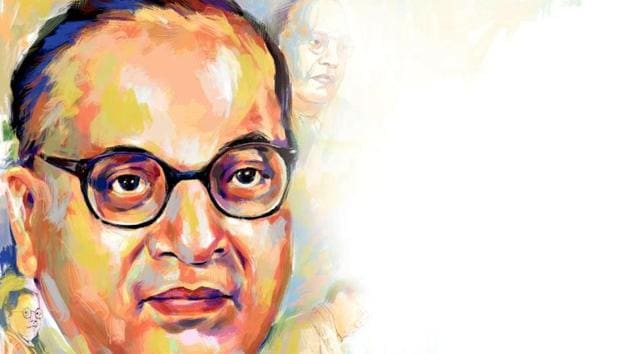Bhimrao Ramji Ambedkar: Father of our Constitution
Popularly known as Babasaheb, he was an economist and social reformer who strongly advocated an end to untouchability directed towards the backward sections of society.
Born on April 14, 1891 at the Mhow military cantonment (present-day Madhya Pradesh), Ambedkar was the youngest among 14 children of Ramji Maloji Sakpal, who held the rank of Subedar in the British army and Bhimabai Sakpal.

Early Life
His family, which was based in Ambavade town in the Ratnagiri district, belonged to socially-marginalised Mahar caste, which suffered from discrimination. In 1897, young Ambedkar shifted base to Bombay. In 1912, he graduated in economics and political science from Elphinstone College. He qualified for a Baroda state scholarship that gave him the chance to pursue a postgraduate course at Columbia University in New York. He travelled to the United States in 1913, and completed MA as well as PhD in Economics.
Fight for justice
After returning, Ambedkar was appointed the defence secretary to the King of Baroda. He was subjected to humiliation on account of his caste. In 1920, he travelled to England again for studies.
Ambedkar established the Bahishkrit Hitakarini Sabha to work for the uplift of the backward classes. In 1932, Ambedkar was invited to attend the Second Round Table Conference in London. There, Mahatma Gandhi opposed any move to set up a separate electorate for those at the bottom of social ladder, on the plea that such a move could split the nation. When the British announced a Communal Award of a separate electorate, Gandhi went on a fast while he was imprisoned at the Yerwada Central Jail,Poona. This deadlock was broken by signing the Poona Pact.
In 1935, Babasaheb, as he was widely known, was appointed the principal of the Government Law College, Mumbai. During this time his wife, Ramabai, passed away. A year later, Ambedkar founded the Independent Labour Party, which contested the 1937 Bombay election to the Central Legislative Assembly, securing 11 reserved and 3 general seats. Ambedkar served on the Defence Advisory Committee and the Viceroy’s Executive Council as minister for Labour.
The Constitution
India gained independence on August 15, 1947, and the new Congress party-led government appointed Ambedkar as the Union Law Minister. He was appointed chairman of the Constitution Drafting Committee. He studied the constitutions of about 60 countries. It took him 2 years and 11 months to prepare the statute of the world’s largest democracy. The Constituent Assembly approved the draft Constitution on November 26, 1949 and the Constitution took effect on January 26, 1950.
He had been suffering from serious health issues since 1955-55. On December 6, 1956 he passed away in Delhi. He became a Buddhist after attending a convention of Buddhist scholars in Sri Lanka. In 1955, he founded the Bharatiya Buddha Mahasabha and, in 1956, completed his final work, The Buddha and His Dhamma.
Awards & recognition
In 1990, he was posthumously awarded the Bharat Ratna. His birthday is celebrated as a public holiday in India - Ambedkar Jayanti, on April 14.
Interesting Facts:
1.Ambedkar’s original surname was Ambavadekar (derived from the name of his native village ‘Ambavade’ in Ratnagiri district). It was his teacher, Mahadev Ambedkar who changed his surname from Ambavadekar to his own surname in the records as he was very fond of him.
2.The Reserve Bank of India was conceptualised on the basis of the guidelines presented by Ambedkar to the Hilton Young Commission in his book, The Problem of the Rupee – Its Origin and Its Solution. The credit of inlaying the Ashoka Chakra in the country’s Tricolour also goes to him.
3.As a member of the Viceroy’s Council from 1942 to 1946, Ambedkar was instrumental in bringing about several labour reforms. He changed the working hours from 12 hours to 8 hours in the 7th session of Indian Labour Conference, which was held in New Delhi in November 1942.
4.Ambedkar was the first Indian to earn a doctorate degree in economics from a foreign varsity. He earned not one but two such doctorates in economics - one from the Columbia University in United States of America and second from the London School of Economics in United Kingdom.
5.Babasaheb Ambedkar was well-versed in nine different languages including Hindi, Pali, Sanskrit, English, French, German, Marathi, Persian as well as Gujarati. He had also conducted an in-depth comparative study of all the religions across the world for almost twenty-one years.
Sources: www.inc.in, wikipedia



